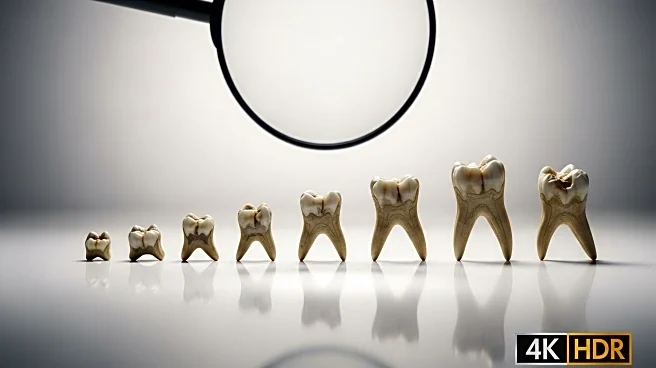What's Happening?
A recent study has revealed significant findings from fossil teeth of an early Homo individual, suggesting alternative explanations for the extended childhood period in humans. The research, conducted at the Dmanisi site in Georgia, utilized synchrotron imaging to examine dental microstructures, providing insights into the growth phases of early humans. The study challenges the traditional 'big brain – long childhood' concept, proposing that cultural learning and social support may have played a crucial role in extending childhood. The fossil, dated to approximately 1.77 million years ago, indicates that early Homo species had a prolonged childhood, relying on adult support for longer periods than great apes. This discovery reshapes views on early human ancestry and development.
Why It's Important?
The findings from the Dmanisi site offer a new perspective on human evolution, emphasizing the role of social structures and cultural transmission in shaping developmental timelines. By suggesting that extended childhood may have preceded brain expansion, the study highlights the importance of intergenerational support and cultural learning in human evolution. This research could influence current understanding of human development, potentially impacting fields such as anthropology, psychology, and education. The study underscores the significance of social networks in early human communities, which may have facilitated the transmission of knowledge and skills, ultimately contributing to the evolution of Homo sapiens.
What's Next?
Researchers are poised to reexamine conventional views on human development, focusing on the interplay between social structures and biological growth. Further studies may explore the implications of extended childhood on cognitive development and cultural evolution. The findings could lead to new hypotheses regarding the evolution of human social behavior and its impact on brain development. As technology advances, researchers may continue to refine methods for studying fossilized remains, potentially uncovering more details about early human life and development.
Beyond the Headlines
The study raises ethical and philosophical questions about the nature of human development and the factors that have shaped our evolutionary path. By highlighting the importance of social support and cultural learning, the research invites reflection on the role of community and cooperation in human history. It also prompts consideration of how modern societal structures can support healthy development and learning in children today.










